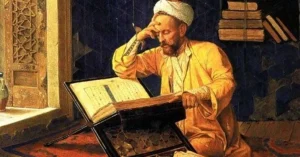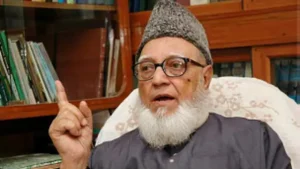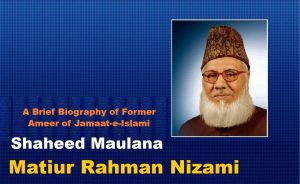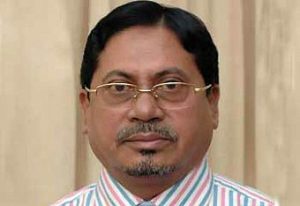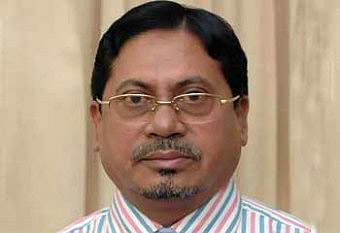
Mohammad Kamaruzzaman
Shahid Kamaruzzaman Khan (1949–2015) was a distinguished Islamic leader, fearless political activist, and a devoted servant of truth and justice. As a central figure in the Islamic movement of Bangladesh, he demonstrated unwavering commitment to Islamic values, maintained strong organizational discipline, and led with sacrificial dedication during some of the most turbulent chapters of the nation’s history.
Born in a politically aware and religious family in the Rajshahi district, Shahid Kamaruzzaman emerged as a bright student and an eloquent orator from an early age. His involvement in student politics, particularly with the Islami Chhatra Sangha—the student wing of Jamaat-e-Islami—marked the beginning of a life dedicated to the Islamic movement. He later rose through the ranks of the organization, eventually becoming one of the central leaders of Bangladesh Jamaat-e-Islami.
Shahid Kamaruzzaman led his political life with unwavering integrity and courage. Even when he faced political persecution and extreme injustice, he stood firmly by his principles. During the Liberation War of 1971, many questioned his role, sparking political controversy and debate. However, many observers believe that political forces fabricated the charges against him as part of a broader effort to dismantle Islamic leadership in the country.
On April 11, 2015, the authorities executed Shahid Kamaruzzaman after conducting a trial that international legal experts and human rights organizations heavily criticized for procedural flaws and denying him due process. He embraced martyrdom with calm dignity and steadfast faith, leaving behind a legacy of devotion, sacrifice, and inspiration for generations to come.
Birth and Early Life
Shahid Kamaruzzaman was born on July 4, 1952, in Bajitkhila village, Sherpur district (then part of greater Mymensingh), East Pakistan. He hailed from a respected, religious Muslim family deeply connected with Islamic values. His father, Insan Ali, played a vital role in shaping his moral and spiritual upbringing.
Childhood Traits and Environment
Growing up in a rural, morally enriched environment, Kamaruzzaman showed sharp intellect, calmness, and spirituality from an early age. The community’s emphasis on simplicity, traditional Islamic teachings, and social responsibility greatly influenced his formative years.
Spouse
Shahid Muhammad Kamaruzzaman Khan wrote the final chapter of his life with courage, patience, and ultimate sacrifice—not with ink, but with unwavering resolve.

Children
Five sons, and one daughter:
- Hasan Iqbal Wami,
- Hassan Iqram Wali,
- Hassam Zaman,
- Hassan Imam,
- Ahmed Hassan,
- Afia Nur
Educational Journey and Early Leadership
He began schooling at Bajitkhila Primary School, excelling academically and showing early leadership. Later, at Sandikona High School and Sherpur College, he developed a keen interest in literature, history, and Islamic studies, while actively participating in extracurricular and religious activities.
Influence of the 1960s Sociopolitical Climate
The political and cultural movements of 1960s East Pakistan awakened his social consciousness. Witnessing injustice and political struggles, he developed a strong sense of purpose and a desire for moral and social reform.
Joining Islami Chhatra Sangha and Early Activism
In 1967, during his student life, he joined Islami Chhatra Sangha, the student wing of Jamaat-e-Islami. His dedication, discipline, and eloquence quickly earned him leadership positions, marking the start of his organized Islamic activism and political involvement.

